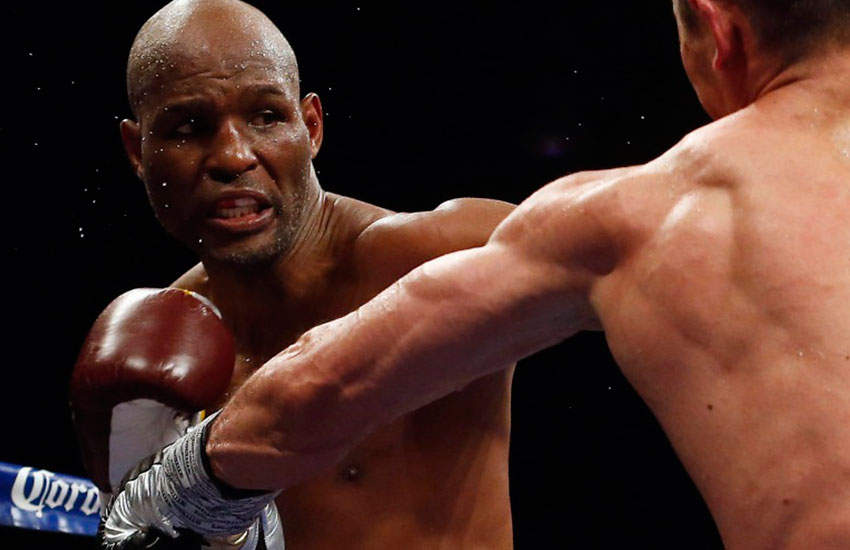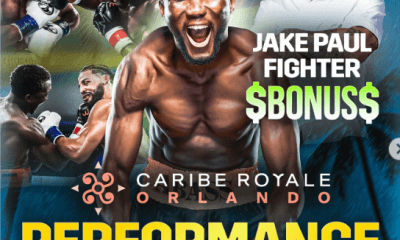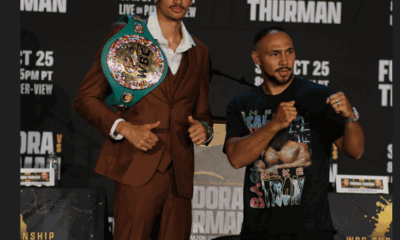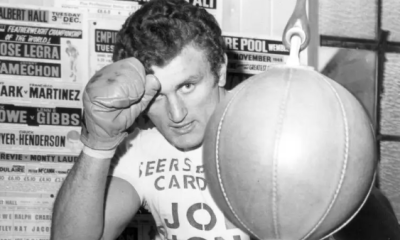Canada and USA
The Bernard Hopkins Saga is a Story for the Ages

BERNARD HOPKINS, AGELESS WONDER — They are billing it as “The Final One,” which strongly suggests that Saturday night’s HBO-televised farewell to boxing by ageless wonder Bernard “The Executioner” Hopkins, who turns 52 on Jan. 15 against 27-year-old Joe Smith Jr., somehow will mark the end of a fighter unlike any that has gone before, and the likes of whom may never come around again.
The fight game’s most drawn-out goodbye might have made more sense were it being held somewhere on the East Coast, closer to Hopkins’ Philadelphia roots, but somehow it is fitting that it will be staged at The Forum in Inglewood, Calif., where 42-year-old Kareem Abdul-Jabbar was still sinking sky-hooks for the Los Angeles Lakers at an age well past most basketball players’ natural expiration dates. Hopkins has been poking fun at his senior-citizen status for at least 15 years, dating back to what arguably has been his seminal victory, a 12th-round stoppage of the undefeated and favored Felix Trinidad, when he was incorrectly dismissed by many as a 37-year-old on the downhill side of a very good career that wasn’t apt to achieve indisputable greatness.
Even if Hopkins holds firm to his vow to forever quit the ring – and that is hardly a guarantee, seeing as how he is still highly competitive in what should be his professional dotage and has come back from two previously announced retirements – there can never be an absolute and definitive finish to the public presence of a man who will continue to command attention as an executive with Golden Boy Promotions and commentator for HBO. Even in the misty future when he is at last outpointed by death, the one opponent no fighter can stave off indefinitely, there is a likelihood the legend of Bernard Hopkins will linger for decades, as is the case for a select few individuals who were so special as to become larger than life. It has been that way for Sugar Ray Robinson and Joe Louis, and will be for Muhammad Ali, who was 74 when he passed away on June 3. While it can be argued that those superb champions were more accomplished than B-Hop, and thus hold a loftier place in the boxing pantheon, none had as much staying power at or near the top of that figurative mountain. It is his remarkable longevity in a sport that tends to chew up and spit out even its finest practitioners that sets Hopkins apart, even when measured against such oldies-but-goodies as Archie Moore and George Foreman.
“I rate people in three categories,” New Orleans-based fitness guru Mackie Shilstone, who has worked with over 3,000 professional athletes and helped bulk up longtime middleweight champion Hopkins to 175 pounds for his winning light heavyweight debut against Antonio Tarver, said in 2011. “One is their chronological age, which you can’t do anything about. You are as old chronologically as it says on your birth certificate.
“There’s your `health’ age, which relates to your internal chemistry, such as percentage of body fat, triglycerides and other measurables. And there’s `performance’ age. There’s no question Bernard Hopkins is as close to a perfectionist with nutrition as anyone I’ve ever dealt with. Bernard’s body does not know what age it’s supposed to be. In theory, for him to be doing what he does at his age (then 46), his heart should explode. But Bernard has taken such good care of himself over such a long period, you can throw all the formulas out the window. Bernard Hopkins can out-condition anyone.”
Lest anyone think that Saturday’s scrap with Smith guarantees the conclusion of the Bernard Hopkins story, imagine how difficult it must be to pin down its beginning. Was it Jan. 15, 1965, when another poor black child was born into the squalor of the North Philly ghetto? On the mean streets of a neighborhood called the “Badlands,” where that child, by now a teenager, was so menacing that he terrorized even fellow residents presumably accustomed to crime and violence? At Graterford State Correctional Facility, where the 17-year-old predator arrived and served 56 months of an 18-year sentence for strong-arm robbery? Might it have been on Oct. 11, 1988, when the paroled ex-con had an inauspicious professional boxing debut, dropping a four-round majority decision to another first-timer named Clinton Mitchell?
The correct answer is, of course, all of the above. The Bernard Hopkins of today is a patchwork quilt of the various Bernard Hopkinses of other times, his passages from one phase to another adding swatches to what has become a complex whole. It is impossible for anyone on the outside to step back and see enough of the big picture to put an improbable life into any kind of perspective. Depending upon the occasion of others’ dealings with him, his journey can be subdivided into those taken by Bernard the desperately hungry waif, Bernard the angry and dangerous adolescent, Bernard the incarcerated dreamer, Bernard the nonconformist, Bernard the despised, Bernard the beloved and, ultimately, Bernard the champion. He has been cursed and celebrated, seemingly in equal measures, but most of the way he has been resolute in his determination to chart his own course.
“You have to live with the choices you make,” he said a few weeks before he received his Manager of the Year Award for 2004 from the Boxing Writers Association of America. “I’ve had my destiny in my hands for a long time. I knew I couldn’t put the blame on nobody else if things didn’t go right, and I knew nobody else could take the credit if they did go right. It was all on me, and that’s just the way I wanted it.”
It could all have gone wrong, so terribly wrong, for the then-17-year-old Hopkins had he allowed himself to fall victim to the revolving door or one-way trip to the cemetery that often is the result for those jaded and disillusioned from doing hard time. In that way, his “graduation” from Graterford’s school of hard knocks represents as much or more of a success than even his ascension to the ranks of elite boxers. But guardian angels are where you find them, and such a savior presented himself in the form of a convicted murderer named Michael “Smokey” Wilson, a three-time middleweight titlist in the Pennsylvania correctional system.
“What I saw was someone who could be saved,” Wilson said in an interview behind prison walls in 2008. “I’d been in the system since I was 17. I didn’t see the extreme hardness in Bernard that a lot of boys come in here with. I saw in him a disposition that he wanted to show his mother that he wasn’t really the person he had been to wind up in this place. We started talking about boxing. He had kind of a tenacity to him, you know? He wanted to be a fighter. I just liked his attitude.
“Bernard was a natural. A lot of guys didn’t want to spar with him. He was that good. And he knew enough to stay away from the drugs and the guys who weren’t really about anything good.”
That spark of possible salvation Wilson detected in Hopkins wasn’t always apparent to everyone. Growing up in the Raymond Rosen projects, Hopkins’ gnawing hunger fueled an inner fire that threatened to consume not only him, but anyone unfortunate enough to cross his path.
“Ever take a piece of bread and have to pick the roaches off it before you eat it?” Hopkins, by then a world champion, said in speaking to kids at the Daniel Boone School, a remedial institution in North Philadelphia from which he was expelled in 1978. “Or open a can of beans and eat ’em right out of the can because the gas has been turned off? I’ve been there. It’s a big part of who I am.
“All of the hardships I’ve endured made me strong, but being strong is not about picking up a gun and preying on somebody else. Being strong is not about taking the easy way out. That’s only going to get you incarcerated, or killed.”
Did those words of wisdom sink in that day? Hopkins hoped they did, but no one knows better than he that the good intentions of today can morph into the bad deeds of tomorrow.
“I told them how adversity hit me upside the head, but I was able to find the strength to overcome it,” Hopkins told his captive audience. “I finally got myself turned around and became a productive citizen. Yeah, I have a nice car, nice clothes. But I got them honestly, through hard work. Sometimes life knocks you on your ass, but you can’t get discouraged. You can do right even when the people around you are doing wrong.
“These kids, they don’t respect themselves. They don’t respect their mamas, they don’t respect authority. They’re headed to where I was when I was their age. Somebody has to let them know there’s a better way.”
It was a lesson Hopkins admits to being slow to learn himself, especially the one about respecting certain kinds of authority. He has feuded with a succession of managers, promoters, trainers and TV executives, earning him a well-deserved reputation for being, well, difficult. But holding firm to his beliefs doesn’t mean he has always been wrong. When his patience for being told what to do at last was exhausted, he simply decided to go it alone, managing himself until he accepted an offer in 2005 to become a limited partner in Golden Boy Promotions by company founder and Hopkins knockout victim Oscar De La Hoya.
“How many stories have you heard about fighters who went broke?” Hopkins said after filing a lawsuit against his then-promotional company, America Presents, in May 1999. “There a lot of those. Now, how many stories have you heard about boxing promoters who went broke? There aren’t any. Promoters hold all the power. That’s the way it’s always been. They’re not going to give up that power and leverage to any fighter, not unless they absolutely have to.
“When you stand up for what you believe, when you’re not a good boy, they shut you down and put you on a shelf. People tell me to tone it down. They say, `Bernard, you’ve been blessed. You’ve got a nice house, a baby on the way (daughter Latrece is now 17). You’ve got some money in the bank. Be a part of the program.’ But I don’t want to be part of the program. I know when someone’s trying to bum-rush me.
“Yeah, I speak my mind. I understand the politics of boxing and, in some people’s eyes, that makes me dangerous. But I won’t be bullied. Bully tactics don’t work with me. If you try to bully me, I fight back. Just because I can fight don’t mean I can’t think.”
Dan Goossen, now deceased but then with America Presents, recalled his time and subsequent legal wranglings with Hopkins as “a nightmare. It’s probably the most disappointing relationship I’ve had in my 20-plus years in boxing. There was no argument as to how good Bernard was as a fighter. Even though I never did anything but try to advance his career, I still wound up in a court of law with him. And I’m not the only one. His track record speaks for itself. He doesn’t fight for what’s right. He just likes to fight, and I don’t mean inside the ring. The man doesn’t need enemies. He’s always been his own worst enemy.”
Similarly harsh opinions have been offered by Hopkins associates du jour Butch Lewis (“He’s an ingrate. I’m not going to let anybody kick me in the ass and take it when I know I’m doing right”), Don King (“A difficult guy who done won the lottery but can’t find the ticket”), Lou DiBella (“He’s dishonest and a punk”) and longtime trainer Bouie Fisher, who once had referred to Hopkins as being like one of his sons until changing his tune in a dispute over compensation (“Bernard wants all the glory, he wants all the credit, he wants all the money. It’s all about him, him, him”).
Those damning assessments, however, are balanced out, or at least softened, by others who see Hopkins in a much more positive light. The late Hall of Fame trainer Emanuel Steward said Hopkins did not deserve to be excoriated for his two splits from his erstwhile father figure, Fisher, particularly for the second one.
“I am really supportive of Bernard,” Steward said in November 2005. “I think he was fair – more than fair – in his dealings with his trainer. Bernard is very sensitive about this. He’s gone through so much negative stuff that he’s getting from all sides. Everybody has something nasty to say about him.”
The kinder, gentler, more caring side of Hopkins has been attested to by the families of the late former WBA super middleweight champion Steve Little and the late Shaun Negler. When he defended his WBC/WBA/IBF middleweight belts against Carl Daniels on Feb. 2, 2002, in Reading, Pa., B-Hop gave $100,000 of his seven-figure purse to Wanda Little and her six children. Little, a former Hopkins sparring partner, was a Reading native who was 34 when he died of colon cancer on Jan. 30, 2000.
“There wasn’t anybody who didn’t love Steve, who was just a genuinely good person,” Hopkins said at the time. “I never heard anybody say a bad word against him. He was a good fighter, but a better man. I think of him as a hero, because he always did right by his wife and kids.”
Hopkins met Negler, then an 18-year-old former amateur boxer who had his left leg amputated below the knee after being diagnosed with Ewing’s sarcoma before his idol’s loss on points to Joe Calzaghe in Las Vegas on April 19, 2008. Negler, a huge Hopkins fan from Northeast Philadelphia, was there with his family through the auspices of the Make-a-Wish Foundation.
“Some people squander their talents in so many ways,” Hopkins told Shaun during a one-hour meeting in the fighter’s hotel suite. “For them, it’s always coulda, shoulda, woulda. They have that mindset. But you’re an inspiration to me, man. Here I am, about to fight Joe Calzaghe, but other people are fighting bigger fights, more important fights. You’re facing a much bigger fight.”
The Neglers and Hopkins remained in touch, and Hopkins attended a birthday party for Shaun for five hours. Shaun died five days after Hopkins’ Oct. 18, 2008, upset victory over Kelly Pavlik, but the young man was able to watch the fight on TV from home before slipping into a coma just an hour later.
“I will always believe that Shaun held on as long as he did because of Bernard,” said Michael Negler, Shaun’s father. “He refused to give in to death until he saw Bernard fight one more time.”
It should be noted that that the Neglers are white; Hopkins had come under fire as an alleged racist for telling Calzaghe, with reporters from the U.S. and Great Britain present, that he “would never lose to a white boy.” But those words more than likely were said simply to build interest in their impending bout.
“People choose up sides for whatever reason,” Hopkins later said by way of explanation. “Go back to Ingemar Johansson and Floyd Patterson. A lot of (white) Americans were for Johansson instead of Patterson. Go back to Larry Holmes and Gerry Cooney. That fight split along racial lines, with black people for Holmes and white people for Cooney. Those guys became very good friends afterwards, but their fights sold better because of the black-white thing. This is not anything new.”
Truth be told, Hopkins’ most impudent comments are usually by design. Take the time he threatened to pull out of his June 5, 2004, bout with Robert Allen because the Nevada State Athletic Commission had assigned referee Joe Cortez, who is of Puerto Rican descent, to serve as the third man in the ring. The supposed rationale for the request is that Cortez might be influenced by Hopkins having twice thrown down the Puerto Rican flag in the lead-up to his big fight with Puerto Rican superstar Trinidad. In the end, Cortez did work the fight, so it might have appeared that Hopkins did not get his way. Then again …
“People say Hopkins is crazy, but he’s shrewd,” said another noted trainer who asked not to be identified. “He knows all the tricks and he can foul so subtly, even the most seasoned referee doesn’t always pick up on it. But Cortez is going to be so conscious of not being involved in any kind of controversy, Hopkins pretty much will be able to do whatever he wants in there without being penalized.”
The many sides of Bernard Hopkins also include his loquaciousness; he can trash-talk with the best of them, even when the give-and-take involves a would-be opponent he never actually faces inside the ropes. When there was talk of B-Hop moving up from middleweight – way up – to fight IBF cruiserweight champ James Toney, the long-distance sniping was especially classic.
“James Toney makes out like he’s this big gangsta,” Hopkins sneered. “Where I come from, we laugh at guys like him. He’s a wannabe. I was in Graterford, where there were guys who’d want to kill you if you looked at them wrong. James Toney wouldn’t have lasted five minutes behind those walls. And he makes out like he’s from Detroit. Come on, the man came up in Ann Arbor. The only Big House they got there is the Michigan football stadium.”
Toney countered with a snappy putdown of his own, saying, “I trained in Detroit. To be a real fighter, you have to go to Detroit. That’s the bottom line. Ain’t nobody ever come out of Philly, and that includes Joe Frazier. He’s really from South Carolina.”
But the idea of Hopkins moving way up in weight to get it on with fellow future Hall of Famer Toney was more than mere fodder for a back-and-forth comedy routine. Hopkins wanted that fight, very much so, and would have gotten it had not the financial arrangements hit a snag that could not be resolved. He also called out then-WBC heavyweight champion Oleg Maskaev, who was 6-foot-3 and 238 pounds. Hopkins figured that if Roy Jones Jr. could move that far up to dethrone WBA heavyweight king John Ruiz, which he did on March 1, 2003, why not him?
“It’ll be just like Rocky IV, with me beating a giant Russian,” said Hopkins, apparently unaware that Maskaev actually was from Kazakhstan.
Joe Smith (22-1, 18 KOs) might not be Toney or Maskaev, but he is a legitimate 175-pounder with a big punch who is coming off a first-round stoppage of world-rated Andrzej Fonfara on June 18. Smith has made no secret of the fact he wants to be the first man to ever defeat Hopkins inside the distance. But that’s just the way Hopkins (55-7-2, 32 KOs) likes it; he wouldn’t want to take a farewell fight, or any fight, that did not contain at least some element of risk. Hopkins took a huge gamble in his most recent fight, and for his trouble he lost every round in a unanimous-decision setback to the fearsome Sergey Kovalev on Nov. 8, 2014. Hopkins is thinking knockout, too, and if he can get Smith out of there it would be his first KO win since he put De La Hoya down and out with a left hook to the liver in the ninth round of their Sept. 18, 2004, clash, a span of 17 fights spread over 12 years, three months.
“It’s the tightrope with no safety net,” he said after his May 21, 2011, dethronement of WBC light heavy titlist Jean Pascal in Montreal. “I need that to be on top of my game. How many people would risk that? A lot of fighters are afraid to fail, so they don’t try. I’m not afraid to try to do great things.”
Trying to do still another great thing 29 days before his 52nd birthday is even more mind-boggling. But don’t be surprised if he pulls another rabbit out of that proverbial hat; Hopkins is slightly more than a 3-1 favorite. He is knocking on history’s door again, and destiny awaits on the other side.
Check out more boxing news on video at The Boxing Channel
-

 Book Review4 weeks ago
Book Review4 weeks agoMark Kriegel’s New Book About Mike Tyson is a Must-Read
-

 Featured Articles3 weeks ago
Featured Articles3 weeks agoThe Hauser Report: Debunking Two Myths and Other Notes
-

 Featured Articles3 weeks ago
Featured Articles3 weeks agoMoses Itauma Continues his Rapid Rise; Steamrolls Dillian Whyte in Riyadh
-

 Featured Articles3 weeks ago
Featured Articles3 weeks agoNikita Tszyu and Australia’s Short-Lived Boxing Renaissance
-

 Featured Articles3 weeks ago
Featured Articles3 weeks agoIs Moses Itauma the Next Mike Tyson?
-

 Featured Articles2 weeks ago
Featured Articles2 weeks agoBoxing Odds and Ends: Paul vs ‘Tank,’ Big Trouble for Marselles Brown and More
-

 Featured Articles3 weeks ago
Featured Articles3 weeks agoAvila Perspective, Chap. 340: MVP in Orlando This Weekend
-

 Featured Articles2 weeks ago
Featured Articles2 weeks agoBaraou Upsets Tellez; Han and Bahdi Win Too at Caribe Royale in Orlando




















